Morgan Bennett-Smith Receives Dana Wright Fellowship
Morgan Bennett-Smith, a second year PhD student in the Buston Lab, received the Dana Wright Fellowship.
Morgan's research explores the ways that the clownfish - sea anemone mutualism changes during different conditions, in particular, climatic stress events. He works on two model systems: the Red Sea clownfish (Amphiprion bicinctus) at sites in Saudi Arabia, and the orange clownfish (Amphiprion percula) at sites in Kimbe Bay, Papua New Guinea. Specifically, Morgan is interested in the impacts of coral reef bleaching events on both mutualistic partners.

This fellowship was established in memory of Dana Wright (CAS ’00), an alum of the BU Marine Program. After completing her studies, Wright went on to work in research in right whale acoustics at the Woods Hole Oceanographic Institution on Cape Cod.
Congratulations, Morgan!
Abigail Robinson Receives 2023 Thomas H. Kunz Award
 Abigail Robinson, a Biology PhD student in the Mullen Lab, received the 2024 Thomas H. Kunz Award. The Kunz Award recognizes and celebrates exemplary contributions by an early or mid-career scientist to the study of bats, including measurable impacts on bat research and/or conservation, student mentoring, public education, and collaborations.
Abigail Robinson, a Biology PhD student in the Mullen Lab, received the 2024 Thomas H. Kunz Award. The Kunz Award recognizes and celebrates exemplary contributions by an early or mid-career scientist to the study of bats, including measurable impacts on bat research and/or conservation, student mentoring, public education, and collaborations.
In her research, Abby studies how predator avoidance strategies, like mimicry, shape communities. Batesian mimicry occurs when palatable mimics gain protection from predators by evolving phenotypic resemblance to a chemically defended model species.
Using a tri-trophic community ecology approach, her work aims to understand factors that maintain Batesian mimicry in native North American butterfly populations. Understanding how mimicry impacts community dynamics will give valuable insight into how mimetic species may respond to changing environments.
This award provides support for Ecology, Behavior & Evolution (EBE) PhD candidates who have completed the qualifying exam, with a preference for those conducting field research in the award year. The award was established in 2015 in recognition and appreciation of Professor Thomas H. Kunz’s mentorship. His current and former graduate students established this award to serve as a lasting legacy of Tom’s contributions at BU and beyond. Learn more about Dr. Kunz and how you can support this award.
Congratulations, Abby!
Alejandro Rondon Ortiz Receives Brenton R. Lutz Award
Alejandro Rondon Ortiz, a Biology PhD student in the Wolozin Lab, received the 2024 Brenton R. Lutz Award.
In his study, Alejandro investigated the protein interaction networks (PINs) from the autophagy receptor SQSTM1/p62. SQSTM1/p62 regulates proteostasis by degrading cellular cargo, including protein aggregates. He employed proximity labeling and proteomics to dissect SQSTM1/p62 PINs under various conditions and revealed novel interacting proteins.
Using these approaches, he demonstrated that dysregulation of proteostasis, induced by small molecules or tau aggregates, shifts SQSTM1/p62 interactors towards stress-associated PINs. This shift is also observed in proteostasis-related diseases like neurodegeneration. These findings highlight the adaptive nature of SQSTM1 PINs and also offer PINs datasets, which can be potentially exploited to explore novel therapeutic targets.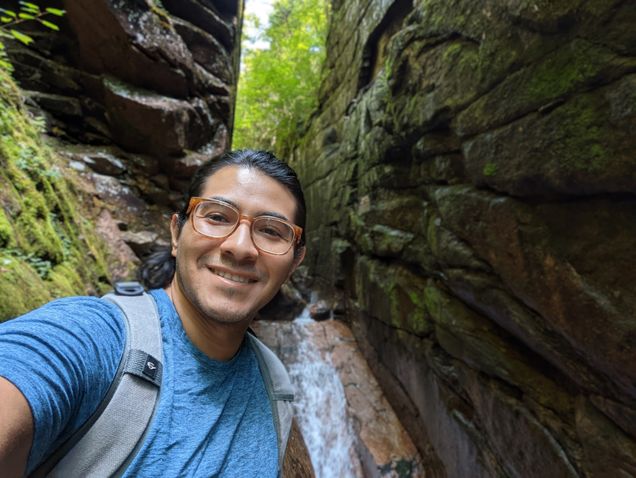
This award provides support for PhD candidates conducting research in neurobiology or neuroscience and have made significant contributions to their field. Brenton R. Lutz was the first person to receive an MD/PhD at Boston University, receiving his PhD in 1916. He later became a Professor and Chairman of BU’s Department of Biology. Dr. Lutz also gave the first University Lecture at BU on December 11, 1950 “The Living Blood Vessels.”
Congratulations, Alejandro!
Caroline Fleming Received McLeod Annual Award
Caroline Fleming, a 4th year Ph.D. candidate in the Rotjan Lab, received the 2024 McLeod Annual Award. She is an eco-physiologist who studies the energetic trade-offs marine organisms make under local and global change.
Her research focuses on the temperate coral, Astrangia poculata, which lives in highly-urbanized, rapidly changing coastal ecosystems up and down the east coast of the United States where it is exposed to nutrient pollution, rising sea surface temperatures, and other stressors. In contrast to tropical corals that require their endosymbiotic algae to survive, Astrangia lives in a facultative symbiosis: existing with and relatively without its symbiont at the same environmental conditions.
This system provides an interesting opportunity to probe the relative contributions of auto and heterotrophy to its energetic budget without stressing the coral into a “bleached” state, and understand the cost and benefits of coral-algal symbioses.
This science will provide critical insight into the mechanisms of coral resilience, which is increasingly important in an era of global change. Caroline uses empirical, theoretical, and quantitative approaches to investigate coral energetic dynamics, and is profoundly grateful to have McLeod support for this work.
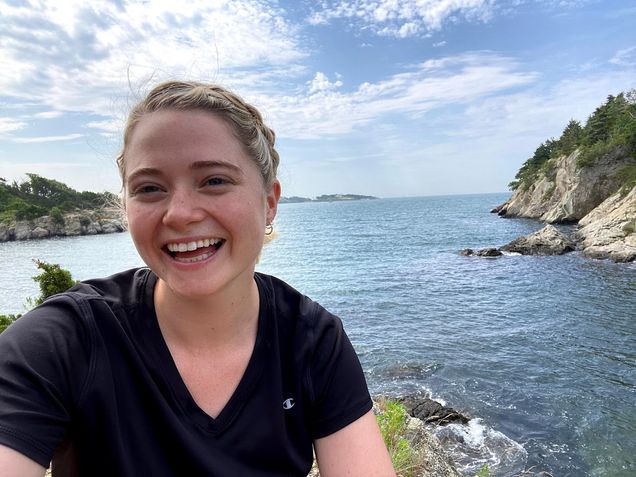
The Warren-McLeod Graduate Fellowship in Marine Science was established by Patricia Warren (the granddaughter of BU’s 1st President, William Fairfield Warren) in 1990 to support graduate students in the BU Marine Program (BUMP). Guy McLeod was Patricia’s brother-in-law and the long-time director of research at the New England Aquarium. He was a marine biologist, whose scholarship focused on the role of iron, vanadium, and other metal ions on the physiological ecology of marine animals.
Congratulations, Caroline!
2024 McLeod Summer Award Recipients
Maria Ingersoll, Biology PhD candidate in the Davies and Gilmore Labs, and Muhan Chen, a Biology PhD student in the Davies Lab, received the 2023 McLeod Summer Award.
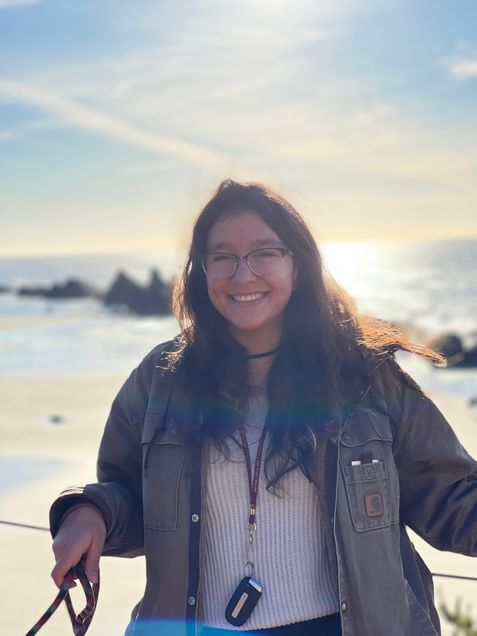 Maria studies the immune system of cnidarians, including coral and sea anemones, specifically in reference to their symbiosis with a photosynthetic algae that lives inside of their gastrodermal cells. Her research leverages a combination of next-generation sequencing, molecular biology, and environmentally relevant susceptibility analyses to perform the following: 1) characterize the influence of symbiosis and starvation on gene expression and stress response programming in the sea anemone E. pallida (Valadez-Ingersoll et al., ProcB 2024), 2) use single-cell RNA sequencing and proteomics to develop an atlas of cell-type composition and gene expression across symbiotic states in the coral O. arbuscula, and 3) use Split Pool Ligation-based Transcriptome sequencing and targeted molecular assays to uncover the molecular specificity of the host immune system for specific symbiont strains in E. pallida.
Maria studies the immune system of cnidarians, including coral and sea anemones, specifically in reference to their symbiosis with a photosynthetic algae that lives inside of their gastrodermal cells. Her research leverages a combination of next-generation sequencing, molecular biology, and environmentally relevant susceptibility analyses to perform the following: 1) characterize the influence of symbiosis and starvation on gene expression and stress response programming in the sea anemone E. pallida (Valadez-Ingersoll et al., ProcB 2024), 2) use single-cell RNA sequencing and proteomics to develop an atlas of cell-type composition and gene expression across symbiotic states in the coral O. arbuscula, and 3) use Split Pool Ligation-based Transcriptome sequencing and targeted molecular assays to uncover the molecular specificity of the host immune system for specific symbiont strains in E. pallida.
Her research provides a substantive contribution to the fields of evolution (characterizing immune systems in basal Metazoa), cell biology (describing the transcriptomic profiles of cell types in previously unexplored taxa), and conservation biology (informing how cnidarian holobionts respond to environmental stress).
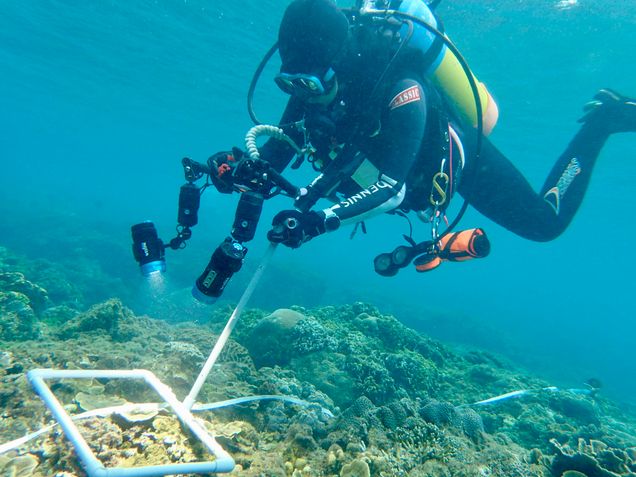 Muhan’s proposed research aims to identify functional interactions between Symbiodiniaceae and bacteria, further exploring their collective impacts on the coral host response to environmental change. She will leverage recent advancements in transcriptomics, metabolomics, and NanoSIP imaging techniques to gain a comprehensive understanding of Symbiodiniaceae-bacteria interactions within coral holobionts.
Muhan’s proposed research aims to identify functional interactions between Symbiodiniaceae and bacteria, further exploring their collective impacts on the coral host response to environmental change. She will leverage recent advancements in transcriptomics, metabolomics, and NanoSIP imaging techniques to gain a comprehensive understanding of Symbiodiniaceae-bacteria interactions within coral holobionts.
To address this overarching objective, she will use the sea anemone Aiptasia (Exaiptasia pallida) and its endosymbiotic Symbiodiniaceae as a model system for cnidarian-dinoflagellate symbiosis. Building upon this Aiptasia-Symbiodiniaceae framework, she aim to integrate bacteria to create a more complex system encompassing cnidarian-symbiont- bacteria interactions. In the upcoming summer of 2024, her primary focus will be on characterizing ex hospite interactions between free-living Symbiodiniaceae and their associated bacteria. She will examine variation in symbiont physiology, microbial composition, and gene expression profiles between axenic Symbiodiniaceae strains and their xenic counterparts.
Results of her proposed research will elucidate the intricate interplay among microscopic symbiotic partners within the cnidarian holobiont. These endeavors hold the potential for invaluable insights, reshaping our understanding of symbiosis with potential future applications for bioengineering in corals, particularly in light of challenges posed by climate change.
The Warren-McLeod Graduate Fellowship in Marine Science was established by Patricia Warren (the granddaughter of BU’s 1st President, William Fairfield Warren) in 1990 to support graduate students in the BU Marine Program (BUMP). Guy McLeod was Patricia’s brother-in-law and the long-time director of research at the New England Aquarium. He was a marine biologist, whose scholarship focused on the role of iron, vanadium, and other metal ions on the physiological ecology of marine animals.
Congratulations Maria and Muhan!
Mandy Pinheiro Receives Belamarich Dissertation Writing Award
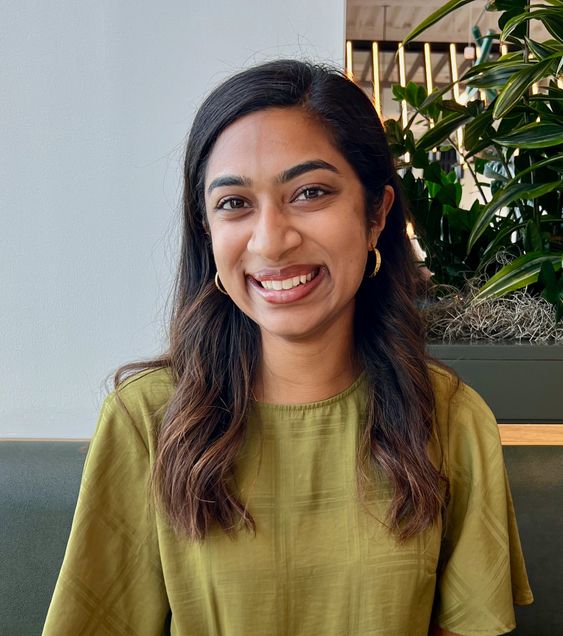 Mandy Pinheiro, a PhD candidate in the Naya Lab, received the Belamarich Dissertation Writing Award. This award complements the Belamarich Award, and is given to support an outstanding PhD student through the dissertation writing stage.
Mandy Pinheiro, a PhD candidate in the Naya Lab, received the Belamarich Dissertation Writing Award. This award complements the Belamarich Award, and is given to support an outstanding PhD student through the dissertation writing stage.
Mandy’s research focuses on understanding how noncoding RNAs (ncRNAs) may be central to the coordination of metabolism and differentiation in skeletal muscle. The regulation of gene expression during cell state transitions is a complex and tightly controlled molecular process. One potential central regulator of myogenesis is the Dlk1-Dio3 ncRNA locus, the largest known mammalian cluster of ncRNAs. She used mouse skeletal muscle cells as a model system to investigate how this ncRNA cluster may coordinate metabolic and epigenetic changes that occur when proliferating myoblasts differentiate into mature myotubes.
Congratulations, Mandy!
Jaice Rottenberg Receives Charles Terner Award
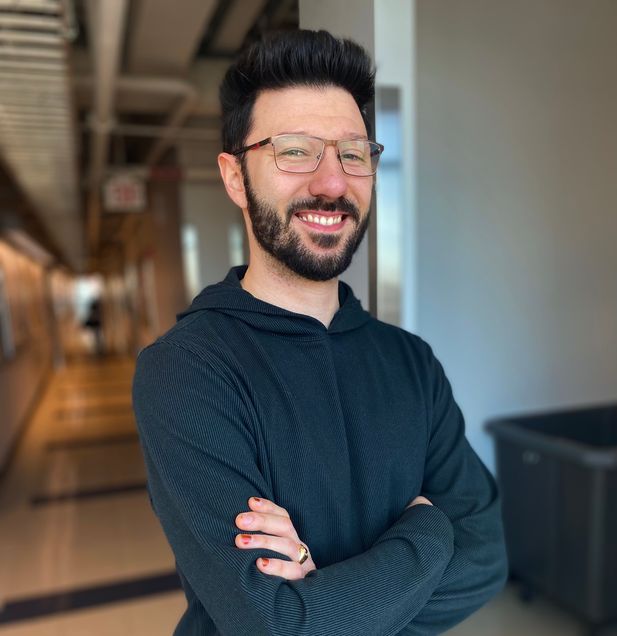 Jaice Rottenberg, a fifth-year CM Ph.D. student in the Fuxman Bass Lab, received the 2024 Charles Terner Award. His lab studies the role of transcriptional regulation in a wide variety of biological processes including development, immune regulation, cancer, and viral infection. His project explores the mechanisms by which human-infecting viruses manipulate the host cellular environment to replicate and survive. Specifically, he is investigating the impact of viral-encoded proteins on host signaling pathways and gene expression.
Jaice Rottenberg, a fifth-year CM Ph.D. student in the Fuxman Bass Lab, received the 2024 Charles Terner Award. His lab studies the role of transcriptional regulation in a wide variety of biological processes including development, immune regulation, cancer, and viral infection. His project explores the mechanisms by which human-infecting viruses manipulate the host cellular environment to replicate and survive. Specifically, he is investigating the impact of viral-encoded proteins on host signaling pathways and gene expression.
This award provides support for a CM or MCBB PhD candidate who has made significant contributions to their field. Charles Terner was a Professor of Biology at Boston University for over 20 years before he retired in 1985. Dr. Terner specialized in biochemistry and focused his research on the metabolic properties of male reproductive cells. The award was established in his memory after he passed away in 1998.
Congratulations, Jaice!
E Schlatter Receives Economakis Award
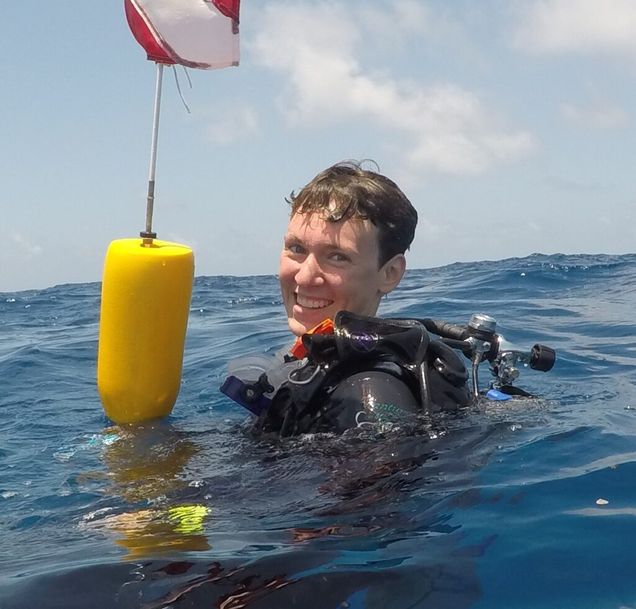 E Schlatter, a PhD candidate in the Buston Lab, received the Economakis Award. In their study, E uses a variety of theoretical and empirical approaches to address questions about the evolution of marine larval dispersal.
E Schlatter, a PhD candidate in the Buston Lab, received the Economakis Award. In their study, E uses a variety of theoretical and empirical approaches to address questions about the evolution of marine larval dispersal.
Their current projects include: using quantitative genetics to ask about the evolutionary potential of dispersal-related traits in the clownfish Amphiprion percula; using a theoretical model to illustrate the roles of opposing components of selection in shaping dispersal patterns; and using genetic simulations and seascape information to create a quantitative link between empirical measures of dispersal and the resulting spatial genetic structure in the neon goby Elacatinus lori.
As a whole, this work contributes to our understanding of how and why organisms have evolved to disperse through the ocean as they do.
Congratulations, E!
Garcia-Marcos Lab work featured in new publication in Cell
The Garcia-Marcos Lab has recently published the development and implementation of a suite of G protein biosensors broadly applicable to detect GPCR activity in scalable assay formats and in physiologically relevant systems like primary cells. By directly measuring endogenous GPCR activity, these biosensors, named ONE-GO, reveal that responses are frequently dependent on the cell context or state. This resource article has been published in the journal Cell and all related plasmid reagents are deposited in Addgene. The work in this paper was led by current PhD student Remi Janicot and former postdoc Marcin Maziarz, and includes collaborations with the Layne Lab in the Department of Biochemistry & Cell Biology, and the Wu lab at Stanford.

Congratulations to the Garcia-Marcos Lab!
Dr. Meg Younger Receives 2024 Sloan Research Fellowship
Three Boston University researchers have been named 2024 Sloan Research Fellows, a competitive award given annually to early-career researchers across a range of scientific disciplines. Among one of the three recipients is neurobiologist Dr. Meg Younger, in the Biology Department.
Since 1955, 59 faculty from BU have received a Sloan Research Fellowship, including this year’s winners. Fellows each receive $75,000 to be spent over two years on any expense to support their research. The foundation says fellows are chosen, in part, for their “potential to revolutionize their fields of study”; winners are selected by committees of distinguished scientists from their respective fields.
Dr. Meg Younger: How well can mosquitoes smell?
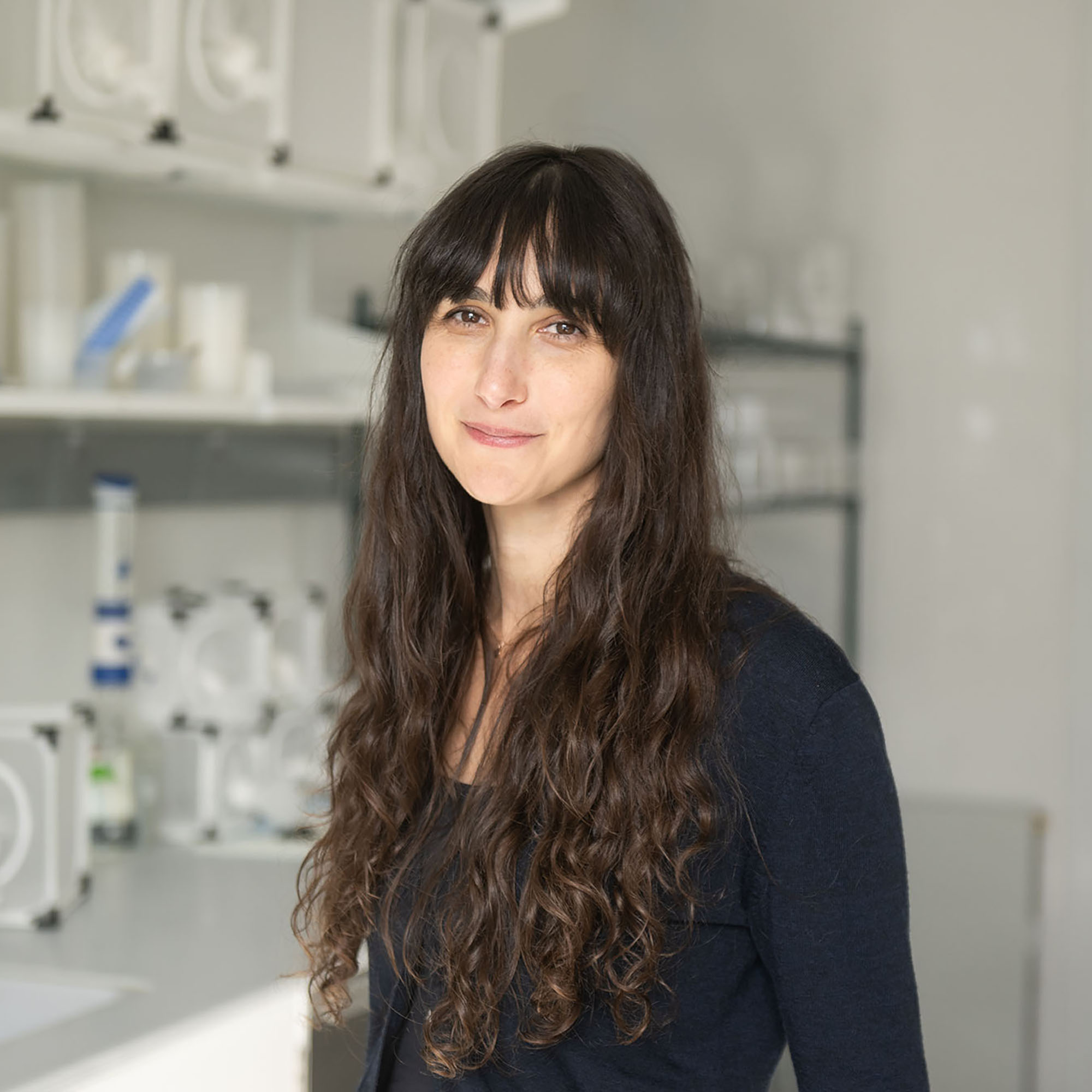
Dr. Meg Younger, a CAS assistant professor of biology, studies how mosquitoes use their sense of smell when looking for a person to bite. Her lab focuses on the Aedes aegypti, mosquitoes that spread numerous diseases like dengue fever, yellow fever, and Zika virus.
“I am excited to make discoveries that advance our understanding of the chemical senses,” Younger says. “Especially in the mosquito olfactory system, because of the relevance to global health, but also to learn how different animals detect and encode odors and find out what diverse strategies exist that enable animals to smell the volatile odorant chemicals in the world around them.”
You can read more about all three recipients and more about Dr. Meg Younger here.
Congratulations to Dr. Meg Younger!